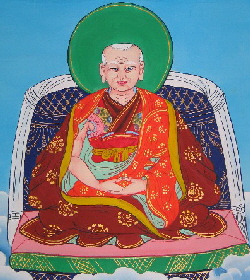Otherwise, whatever love, compassion, sympathetic joy we generate will tend to be one-sided and not completely pure. ... Impartiality means giving up our hatred for enemies and infatuation with friends, and having an even-minded attitude toward all beings, free of attachment to those close to us and aversion for those who are distant.
 The
book is a classic introduction to Tibetan Buddhism and takes a long
view. Those who are now seen as enemies, he says, could be our children
in our next life, and our friends could be our enemies. Our friends now
may harm us more than our enemies if a desire to be with them keeps us
from practicing the dharma. "Make a firm decision," he
says, "to see all beings as your parents and children." (In traditional
Buddhist teachings, it is assumed that you are filled with warm regard
and unconditional love for your parents.)
The
book is a classic introduction to Tibetan Buddhism and takes a long
view. Those who are now seen as enemies, he says, could be our children
in our next life, and our friends could be our enemies. Our friends now
may harm us more than our enemies if a desire to be with them keeps us
from practicing the dharma. "Make a firm decision," he
says, "to see all beings as your parents and children." (In traditional
Buddhist teachings, it is assumed that you are filled with warm regard
and unconditional love for your parents.)Impartiality, he cautions, does not mean indifference. "It is no substitute for boundless impartiality just to think of everybody, friends and enemies, as the same, without any particular feelings of compassion, hatred, or whatever. That is mindless impartiality... Our attitude toward all beings throughout space should be a vast feeling of compassion, encompassing them all equally."
That's a tall order.
In the section on love (he doesn't include kindness in the name), he says to generate the feeling that all beings are your young children. If you have children, that's a powerful tool. Here are some other techniques he suggests:
-- Meditate on the thought of "how wonderful it would be if each one of those beings could have all
 the happiness and comfort they wish." I imagine that if that happened, conflict would cease. How wonderful that would be.
the happiness and comfort they wish." I imagine that if that happened, conflict would cease. How wonderful that would be.-- When you look at someone, let your expression be smiling and pleasant, an expression of your open heart, rather than scowling or angry.
-- Make your words pleasant. Avoid expressing contempt, criticism, and jealousy.
-- When you help others, don't expect recognition for it. Do it to help, not to bolster your ego.
-- Try to find ways to introduce others to the Dharma.
All beings are striving for happiness and comfort, They all want to be happy and comfortable, not one of them wants to be unhappy or to suffer, Yet they do not understand that the cause of happiness is positive actions ... in their attempt to find happiness, they only bring suffering upon themselves.Love all/serve all.
No comments:
Post a Comment